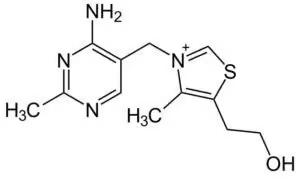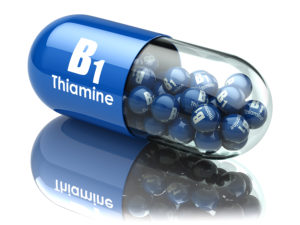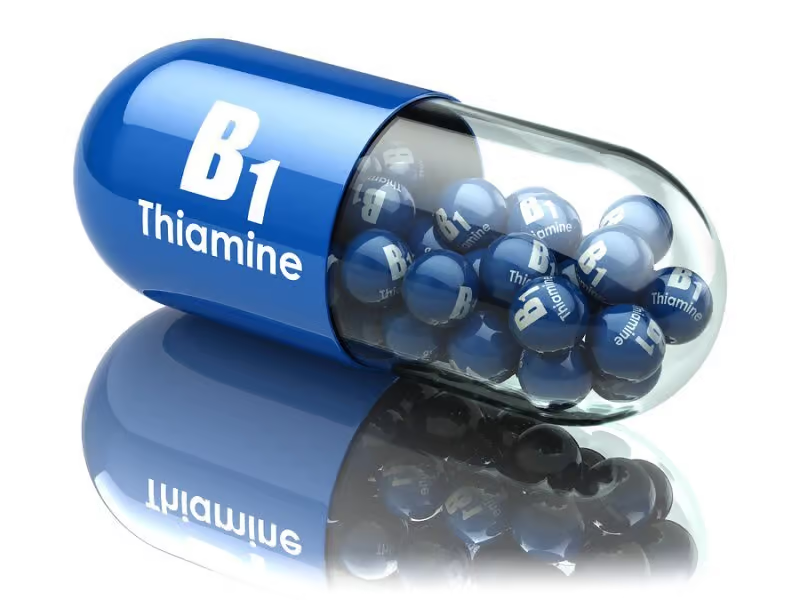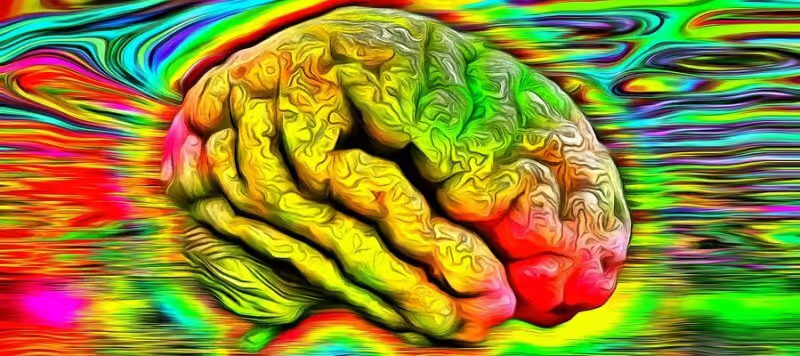Table of Contents
Vitamin B1 (Thiamine) is the first B Vitamin to be discovered by researchers. “Thio-vitamine” refers to its sulfur-containing content. It’s called B1 because it was the first of the B complex vitamins to be identified.
It was Kanehiro Takaki, surgeon general of the Japanese navy back in 1884 that figured something was amiss. Sailors were dying on his ships from a disease called Beriberi. And Takaki surmised it had something to do with sailors eating only white rice.
It wasn’t until 1897 that Christiaan Eijkman, a military doctor in the Dutch East Indies figured out that the bran removed from white rice was causing problems. Something was missing in the diet.
In 1911, Polish biochemist Casimir Funk isolated what he called a “vitamine” from rice bran. Dutch chemists went on to isolate and crystallize the active agent in 1926. US chemist Robert Williams determined the structure of Vitamin B1. And synthesized it in 1936.[i]
In Japan, it was found that insufficient thiamine led to a central nervous system disorder called Beriberi. But supplementing with thiamine alone didn’t help because of its poor bioavailability. A lot of thiamine was needed to cure Beriberi symptoms.
So Japanese scientists created a derivative of Vitamin B1 called Sulbutiamine in an attempt to quell the health crisis within the Japanese population.
Sulbutiamine is far more bioavailable than standard thiamine. It is fat-soluble (thiamine is water-soluble) which helps it more easily cross the blood-brain barrier.
Advanced neurohackers add Sulbutiamine to their stack instead of standard Vitamin B1 (thiamine) because it’s better absorbed and used by your brain than B1.
Thiamine is a coenzyme used by your body to metabolize food for energy. And to maintain proper heart, nerve and brain function.
Thiamine also helps digest and extract energy from food. It turns nutrients into adenosine triphosphate (ATP). ATP is the cellular energy source synthesized within mitochondria.
And thiamine helps convert carbohydrates into glucose. The energy your body uses for your brain and nervous system.
One more thing about this miracle B-vitamin. Thiamine contributes to the development of myelin sheaths which wrap around neurons to protect them from damage.
Vitamin B1 (Thiamine) helps:
- Brain Optimization: Thiamine is critical for increasing focus, energy, and preventing memory loss. And can ward off inflammation. Healthy brain function is crucial for good decision making.
- Neurotransmitters: Thiamine is essential for producing the neurotransmitter acetylcholine (ACh). ACh is used to relay messages between neurons in your brain. And is critical for cognition, learning and memory.
- Mood: Thiamine helps your body withstand stress. A lack of energy can contribute to poor mood and motivation. Thiamine can boost your mood, and defend against depression and anxiety.
What is Vitamin B1 (Thiamine)?
Vitamin B1 (Thiamine) is the first of the B-Complex vitamins identified. And designated B1 as a result.

Japanese researchers were the first to determine that something was missing in the diet of those who ate only polished rice.
Polished rice is one of the first “processed foods”. And of course there were problems right from the start. The bran coating on rice kernels contained what was later identified as thiamine (Vitamin B1).
The Japanese population were severely thiamine-deficient from this rice-only diet. Large numbers of the population were suffering from Beriberi. A central nervous system disorder caused by a lack of thiamine.
Once scientists determined it was thiamine that was behind a major, country-wide health crisis, they went on to develop Sulbutiamine. It was better absorbed by the brain than standard thiamine.
Your body does not produce thiamine on its own. So you must get it from food including beef, brewer’s yeast, legumes (beans, lentils), milk, nuts, oats, oranges, pork, rice, seeds, wheat, whole-grain cereals, and yeast.
But thiamine has poor bioavailability when taken as a nootropic supplement. A derivative of thiamine called Sulbutiamine is a fat-soluble compound that is easily digested. And readily crosses the blood-brain barrier.
Thiamine vs. Sulbutiamine: What’s the Difference?
Sulbutiamine is a synthetic version of Vitamin B1 (Thiamine). It is two B1 molecules chemically bonded together.
Thiamine is water-soluble and does not easily cross the blood-brain barrier. Sulbutiamine is a fat-soluble compound that easily crosses the blood-brain barrier.
Sulbutiamine functions in the body just like thiamine. But because it’s more bioavailable it’s more effective than thiamine.
How does Vitamin B1 (Thiamine) work in the Brain?
Vitamin B1 (Thiamine) boosts brain health and function in several ways. But two in particular stand out.
- Thiamine increases levels of thiamine pyrophosphate (TPP). TPP is directly involved in the citric acid (KREB) cycle in the brain.
This cycle breaks fatty acids, amino acids and monosaccharides into smaller molecules that produce adenosine triphosphate (ATP) energy within your mitochondria. And provide the building blocks of the molecules needed to produce brain cells.
A deficiency of TPP can eventually show up as Wernicke encephalopathy and Korsakoff syndrome. In our society this syndrome is typically caused by chronic alcoholism. But it can also occur after obesity (bariatric) surgery, Crohn’s disease, anorexia, diabetes, and if you’re on kidney dialysis.
Symptoms of Wernicke-Korsakoff syndrome include confusion, inability to form memories, loss of memories and muscle coordination, confabulation (making up stories) and vision changes. And can ultimately (and very rapidly) lead to coma and death.[ii]
Less severe cases of thiamine deficiency include fatigue, weight loss, irritability and confusion.
- Thiamine also contributes to the production of the enzyme PDH which is essential for making the neurotransmitter acetylcholine. And for the synthesis of myelin, which forms a sheath around the axons of neurons. Ensuring these neurons can conduct signals.[iii]
The citric acid (KREB) cycle and enzyme α–KGDH play a role in maintaining optimal levels of the neurotransmitters glutamate, and gamma–aminobutyric acid (GABA).
When thiamine levels decrease, the activity of these enzymes are reduced.[iv]
How things go bad
We depend on our diet for thiamine. Very little thiamine is stored in your body. And depletion can occur within 14 days.
Thiamine deficiency can be caused by alcoholism, Alzheimer’s Disease, anemia, athletes who reduce food intake, cancer, clogged arteries, Crohn’s disease, diabetes, diarrhea, gastric bypass surgery and kidney disease. And even a poor diet.
Several foods are also considered “anti-thiamine factors” (ATF) and contribute to the risk of thiamine deficiency in otherwise healthy people. Certain plants contain ATF, which react with thiamine to form an oxidized, inactive product.
Consuming large amounts of tea and coffee (including decaffeinated), as well as chewing tea leaves and betel nuts, have been associated with thiamine depletion in humans.[v]
ATF include mycotoxins (molds) that break thiamine down in the blood. If you eat certain raw, fresh-water fish, raw shellfish and ferns you are at a greater risk of thiamine deficiency.[vi] Thiamine is also inactivated by cooking food.
Thiamine is a cofactor of several enzymes including transketolase, pyruvate dehydrogenase, and alpha-ketoglutarate dehydrogenase. Thiamine deficiency decreases cerebral glucose utilization which results in mitochondrial damage.
Scientists have seen through the electron microscope; disintegrating mitochondria, chromatin clumping, and swelling of degenerating neurons. Yikes!
↓ Low thiamine levels can slow creation of ATP
↓ Energy levels drop
↓ Low thiamine levels can cause problems with memory, learning, recall and perception
↓ Acetylcholine levels decline
↓ Blood pressure drops, reflexes decline, and calf muscles get tender
↓ Heart muscles enlarge
↓ Severe thiamine deficiency can result in psychosis
Thiamine supplementation can help nearly every active adult, as well as a student looking to do better in school. By boosting acetylcholine, glutamate and GABA in the brain. Providing increased brain energy by contributing to the synthesis of ATP. And building myelin sheaths that protect our axons needed for brain cell signaling.
Vitamin B1 (Thiamine) Benefits
Thiamine occurs in your body as free thiamine and as various phosphorylated forms: thiamine monophosphate (TMP), thiamine triphosphate (TTP), and thiamine pyrophosphate (TPP), which is also known as thiamine diphosphate.
The synthesis of TPP from free thiamine requires magnesium, adenosine triphosphate (ATP), and the enzyme thiamine pyrophosphokinase. TPP is required for the metabolism of carbohydrates and branched-chain amino acids.
Thiamine is directly involved in the citric acid (KREB) cycle that provides adenosine triphosphate (ATP) cellular energy created in your mitochondria.
Thiamine also plays a role in maintaining optimal levels of the neurotransmitters glutamate, and gamma–aminobutyric acid (GABA). And contributes to the production of the enzyme pyruvate dehydrogenase (PDH) which is essential in making the neurotransmitter acetylcholine.
Thiamine will boost cognition, memory and decision-making. And provides very effective anxiolytic (anti-depressant) qualities.
How does Vitamin B1 (Thiamine) feel?
Thiamine is water-soluble, and has been shown to improve glutamate, and γ-aminobutyric acid (GABA) neurological transmissions.[vii]
If you are perfectly healthy and don’t have a thiamine deficiency, you’ll likely not feel anything after supplementing with thiamine.
But I’ve come across study after study, and reports on forums, where lab tests showed thiamine and thiamine pyrophosphate within range. And yet people were dealing with “mild thiamine deficiency”. The problem is “mild thiamine deficiency” can turn your world upside down.
If you are hypothyroid or dealing with Hashimoto’s there is a very good chance you would benefit from thiamine supplementation. Same with diabetes, fibromyalgia and inflammatory bowel disease.
Neurohackers report that supplementing with thiamine is an effective mosquito repellent.
Many report thiamine supplementation boosts attention, energy, and motivation. A reduction in brain fog and increased mental clarity with less anxiety.
Those dealing with fibromyalgia and nerve pain report a significant decrease in pain levels.
Vitamin B1 (Thiamine) Clinical Research
Most of the research conducted on Vitamin B1 (Thiamine) has been with people dealing with fatigue or pain associated with fibromyalgia, thyroid disease and other debilitating conditions. And most have very few participants. But the results in every trial I’ve reviewed are profound.
Vitamin B1 (Thiamine) Improves Symptoms of Fibromyalgia
If you’ve ever had to deal with fibromyalgia, you are familiar with the hell of living with chronic pain, fatigue, insomnia and more.
Some studies suggest that many of the symptoms of fibromyalgia could be related to mild thiamine deficiency due to a dysfunction of the active transport of thiamine from blood to the mitochondria.
One very small study conducted in Italy recruited 3 female patients with fibromyalgia. Levels of thiamine and thiamine pyrophosphate in the blood were measured. The patients then received from 600 mg to 1800 mg of thiamine per day. And the results were astounding:
- Patient 1: 3% reduction in fatigue; 80% reduction in pain
- Patient 2: 37% reduction in fatigue; 50% reduction in pain
- Patient 3: 7% reduction in fatigue; 60% reduction in pain
One patient reported improvement at 600 mg of thiamine. Doses for the other 2 patients were increased by 300 mg every 3 days. And experienced improvement in their symptoms at a dose of 1500 mg. None of the patients experienced side effects.[viii]
Vitamin B1 (Thiamine) for Chronic Fatigue
If you deal with chronic fatigue, Thiamine may be a better option than another cup of coffee. Or a stimulant.
Researchers in Italy noted that previous studies on fatigue and related disorders like inflammatory bowel disease improved after therapy with high-dose thiamine.
The team chose 3 stroke patients who also experienced fatigue. Severity of fatigue was assessed using the Fatigue Severity Scale. Note that lab tests showed free thiamine and thiamine pyrophosphate levels were within the healthy reference range in all the patients.
High-dose thiamine therapy was started. And resulted in a significant decrease in fatigue.
The researchers concluded that post-stroke fatigue and related disorders could be a manifestation of mild thiamine deficiency. Likely due to dysfunction of intracellular transport of thiamine, or other enzyme abnormalities.[ix]
Vitamin B1 (Thiamine) and Hashimoto’s Thyroiditis
Researchers in Italy hypothesized that the chronic fatigue accompanying inflammatory and autoimmune diseases is a clinical manifestation of mild thiamine deficiency.
Hashimoto’s thyroiditis is both an autoimmune disease and cause of hypothyroidism. In this study, 3 Hashimoto’s patients complaining of chronic fatigue were recruited.
All 3 patients received 600 mg of thiamine per day, or 100 mg of thiamine intravenously (IV) once every 4 days. Thiamine treatment led to partial or complete remission of fatigue within a few hours or days.[x]
Vitamin B1 (Thiamine) recommended Dosage
The recommended dosage of Vitamin B1 (Thiamine) according to the American FDA is 1.2 mg per day. Pregnant and breastfeeding women is a whopping 1.4 mg per day.
Many neurohackers would laugh at these recommendations. “Mild thiamine deficiency” affects a significant segment of the population in any country.
Most clinical studies use thiamine doses from 300 up to 1800 mg per day.
The bottom-line is thiamine dosing is completely up to you. No side effects are reported even at higher doses.
The Mayo Clinic recommends:
- Menstrual cramps – 100 mg per day
- Epilepsy – 50 mg per day
- Alcoholic liver disease and withdrawal – 100 mg injections of thiamine hydrochloride
- Coma or hypothermia – 100 mg injections
- Thiamine deficiency due to nutrition – 100 mg injections
- Wernicke-Korsakoff Syndrome – 5 – 200 mg injections[xi]
Some natural health clinics offer (expensive) thiamine therapy intravenously (IV) and doses are usually 25 – 50 mg per session.
Vitamin B1 (Thiamine) Side Effects
Vitamin B1 (Thiamine) is non-toxic. So is considered well-tolerated and safe.
Side effects are rare but very high doses can include stomach upset.
If you are taking Digoxin, diuretics or Dilantin you should consult your doctor before supplementing with thiamine.
Vitamin B1 (Thiamine) types to buy
Thiamine hydrochloride (HCl): Most Vitamin B1 (Thiamine) supplements available from online retailers and vitamin shops come as Thiamine hydrochloride (HCl). And come in 50 – 500 mg tablets.
Benfotiamine (S-benzoylthiamine O-monophosphate) is a synthetic S-acyl derivative of thiamine. This fat-soluble form of thiamine is much more bioavailable than HCI. Benfotiamine typically comes in 150 – 250 mg capsules. Dosage is up to 900 mg per day.
Tetrahydrofurfuryl disulfide (TTFD) (Fursultiamine): TTFD is a disulfide derivative of thiamine developed in Japan for treating Beriberi. It’s a synthetic form of thiamine naturally occurring in garlic.[xii]
TTFD is a form of thiamine that is water-soluble, and much more difficult to find in vitamin shops. Brand names include Lipothiamine, Allithiamane, Adventan, Alinamin-F, Benlipoid, Bevitol Lipophil, Judolor. TTFD comes in 50 mg capsules. And the primary side effect is you smell like garlic after taking it.
Sulbutiamine: Sulbutiamine is my preferred form of Vitamin B1 (Thiamine) for cognitive enhancement. Sulbutiamine is sold in tablet, capsule and powder form. Tablets and capsules are usually 750 mg each.
Sulbutiamine is a synthetic version of thiamine (two thiamine molecules bound together). It’s sold as a prescription medication in some countries under the brain names Arcalion, Enerion, Bisibuthiamine, and Youvitan.
Multivitamins: Most multivitamins also include some form of Vitamin B1 in their formula. But many of these multis don’t contain enough for optimum health. And many have an inferior isolated or synthetic version of the nutrient.
The Performance Lab® NutriGenesis Multi offers a nature-identical form of Vitamin B1 (thiamine) and is now my favorite daily multivitamin/mineral supplement. You can also get Thiamine in: Performance Lab® (NutriGenesis®) B-Complex
I prefer the Performance Lab® multi because it’s more potent, it’s biologically active and I’ve found to be a far more effective multi compared to every other multivitamin supplement I’ve ever used.
Performance Lab® uses their own priority NutriGenesis® vitamins and minerals which are grown on probiotic, plant and yeast cultures in a state-of-the-art lab.
Nootropics Expert Recommendation
Vitamin B1 (thiamine) 50 – 100 mg per day
 I recommend using Vitamin B1 (Thiamine) as a nootropic supplement.
I recommend using Vitamin B1 (Thiamine) as a nootropic supplement.
Your body does not make thiamine on its own. So to get its benefits you must get it from food, or take it as a supplement.
Vitamin B1 is especially helpful for those suffering from low energy levels, anxiety, depression, and chronic pain.
Experience shows thiamine helps stop and reverse the symptoms associated with fatigue. Likely because this nootropic helps boost the activity of acetylcholine, GABA and glutamate in the brain.
Thiamine is also a very effective mosquito repellent. I live in SE Florida where we’re currently under a Zika scare. But I do not experience problems with mosquitoes. Likely because of adequate thiamine levels in my body.
Personally, I’ve found Sulbutiamine to be much better for cognition than standard thiamine. And more effective (and safer) than any prescription anti-depressant I’ve ever tried.
Sulbutiamine is also particularly helpful to students and executives who want to boost cognition, learning and memory.
Vitamin B1 can produce a noticeable increase in mental clarity. And give you a significant energy boost physically and mentally. You’ll feel more awake and alert. Without the side effects you’d get from stimulants like caffeine.
Vitamin B1 is a must have addition for any nootropic stack. If you are using any of the racetams like Piracetam and Aniracetam you may want to consider adding Sulbutiamine as well.
At the very minimum every neurohacker should be using a multivitamin every day that includes Vitamin B1 (thiamine). The best multi I’ve found and use every day is the Performance Lab® NutriGenesis Multi for men or women.










Join The Discussion - 116 comments
Julia
March 4, 2021
Hi,
First, I would like to THANK YOU for the detailed information of Thiamine. I have been trying to get a handle on my issues and after reading this post, I have a strong feeling that I need to increase my B1. I recently had my annual labs done and my level is at 88, which is at the lower end of the “normal” ranges. As an RN, I know that mainstream medical lab values are FAR from optimal, so I know that my PCP will not even address my B1 level during my next appointment.
I had had gastric bypass 17 years ago and have had severe anemia and chronic fatigue for the past 14 plus years. Almost 4 years ago, I had a severe medication reaction that caused muscle damage and pain that is not relieved by anything.
And, I have what I like to call squirrel brain and have a VERY hard time focusing on things. I am very cautious about taking synthetic medications and supplements due to having MTHFR and not being able to detox properly. Will Thiamine HCl be helpful for what I have going on?
Thank you,
Julia
David Tomen
March 5, 2021
Julia, thiamine supplementation will increase thiamine levels in your body. But NOT your brain. For that you must use Sulbutiamine. Which is perfectly safe and really works.
Please keep in mind that most vitamins on the market are synthetic. With very few exceptions. The only “natural” way to get these nutrients (besides food) are vitamins and minerals grown in different types of yeast. Like the Performance Lab line of supplements.
It sounds like you are nutrient deficient and likely have dysfunctional mitochondria which is where ATP is made. And your most fundamental source of energy.
I suggest trying these two supplements and see if they help you:
https://bit.ly/2EIyhCA
https://bit.ly/3ifR1XJ
Angelique
February 22, 2021
Hello, can you tell me the difference between the TPP form of thiamine and the one you’re suggesting please?
David Tomen
February 23, 2021
Angelique, you can consider Thiamine as the transport form of the vitamin. And then there are 5 known natural thiamine phosphate derivatives, one of which is thiamine diphosphate (ThDP) which is also sometimes called thiamine pyrophosphate (TPP).
Each of these forms of thiamine play a different role in your body. But it’s far too complicated to try to explain here.
The one I suggest and use personally is Sulbutiamine which is two thiamine molecules bound together. Making it fat-soluble and able to cross the blood-bain barrier much more readily than any other from of thiamine we can use as a supplement.
David Bostrom
December 28, 2020
Hello Sales,
I would like to check if you have the powder chemical product below in your store and would like to know your best price on it.
Vitamin B2 Riboflavin USP Grade
Vitamin B1 Thiamine HCL USP grade
Vitamin B6 Pyridoxine USP grade
David Tomen
December 28, 2020
David, I don’t sell “powder chemical product(s)” but personally get mine from HR Supplements in Nevada when I need them: http://bit.ly/3o7m7UU
Shawn
December 18, 2020
How effective is thiamine for dopamine receptor sensitivity? I’m trying to repair my dopamine receptors? Any better alternatives?
David Tomen
December 20, 2020
Shawn, far better option for dopamine receptors is N-Acetyl L-Cysteine (NAC), then Aniracetam and Phosphatidylserine (PS).
Fernando
November 26, 2020
David, how bad is it to consume Vitamin B1 in the form of thiamine hydrochloride? Is it well absorbed compared to other forms on the market?
David Tomen
November 27, 2020
Fernando, it’s not ‘bad’ per se but it can’t cross the blood-brain barrier. That is why Sulbutiamine was developed by the Japanese.
Fernando
November 27, 2020
Thanks for answering,
in my country I only get benfotiamine, it is just as effective as Sulbutiamine, or what are its cons?
– I would also like to know, please, what other vitamins (in addition to B1) face this problem of not crossing the BBB if we consume it in water soluble form?
– Finally, I would like to know if consuming coconut oil in intermittent fasting would break the fast?
David Tomen
November 28, 2020
Fernando, Benfotiamine can not cross the blood-brain barrier. It only works in peripheral tissue throughout the rest of your body. But not in your brain. Not at the rate that we need for nootropic benefit.
The other B-Vitamins do not seem to have this problem. Especially if you use the natural bioactive form and not synthetics.
It is my opinion that unrefined coconut oil used in small quantities (i.e. one tablespoon) does not break a fast. But there are fasting fundamentalists who would disagree with me. A better option for both sides is MCT Oil which directly goes to produce ketones. And definitely does not break a fast.
Joseph Marino
August 19, 2020
HI David, I am 69 years old and last August/19 I had an event of not being to walk straight and felt that I was out of balance. I experienced dizziness, the sound of my voice changed in tone (like I had a cold) I was not able to sing or hymn a song, my vision on my right eye was somewhat impaired fuzzy, Lately my speech is being affected and it is difficult to speak freely as before, I have to think of the words I am trying to say. Same time I started having pains in my left legs. Doctor says that it is caused by poor blood circulation leading to what appears as veins ulcers.
I’ve seen a physiotherapist and he says that I don’t have vertigo but my nerve to my right eye is somewhat damaged. The signal coming from the brain to the ears is out of balance. The ears don’t get the signal from the brain at the same time causing me not to walk straight and out of balance. I also have been feeling very weak like I have no energy whatsoever. I am sure that what I am experiencing is a nerve issue.
I read that these various symptoms are consistent with Vitamin B1 deficiency causing these effects on my nervous system controlling my speech, vision, balance. Will supplementing with Sulbutiamine help resolve these symptons and at what dosage. Your advise is greatly appreciated.
David Tomen
August 21, 2020
Joseph, if you truly are thiamine deficient I suggest supplementing with Sulbutiamine (https://nootropicsexpert.com/sulbutiamine/) instead which is far more effective.
I also suggest you do what you can to increase blood flow. And in your case I’d treat this as a priority and use two nootropics: Vinpocetine (https://nootropicsexpert.com/vinpocetine/) and Pine Bark Extract (https://nootropicsexpert.com/pine-bark-extract-pycnogenol/).
That “event” you had Aug. 2019 sounds a lot like a mini-stroke. Which would not be surprising considering what you now know about blood flow and your age. If this is the case, you should know that research shows it will likely happen again. Unless you do something to prevent it.
Please carefully read my research on Best Nootropics for the Aging Brain. And follow the suggestions. I’ve lost count of the number of people I’ve consulted with who have followed the advice shared in this article. And reported back with success story after success story. You’ll find that article here: https://nootropicsexpert.com/best-nootropics-for-the-aging-brain/
Tiago
July 8, 2020
Can I take subultiamine at night? I’m asking this because I fast for 23hrs every day and subultiamine is fat-soluble.
David Tomen
July 9, 2020
Tiago, if you take Sulbutiamine late in the day you may find it interferes with sleep. Because some find it has mild stimulant effects. Only way to know if it has this effect on you is to try it and see.
Bob Forney
March 5, 2020
Do you have research or lab results showing the thiamine works on mosquitoes or biting insects ,thks
David Tomen
March 5, 2020
Bob, apparently there was a study back in the 1960’s showing thiamine effective in repelling mosquitoes. But studies since then have been inconclusive. So the answer to your direct question is “NO”.
But I’ve personally found that when using Sulbutiamine I don’t get bit and I live in S. Florida. While others around me are being eaten alive. And I’ve also found that if I forget to order and am without Sulbutiamine for a week or two mosquitoes find me quite tasty.
So the claims you read on forums and in blogs are true based on my experience. I suggest trying it this summer and see if we’re right!. But it takes much higher dosages than the government RDA suggests for adult humans.